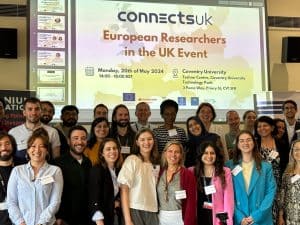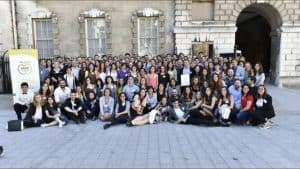- The Society of Spanish Researchers in the United Kingdom (SRUK/CERU) and the Women for Africa Foundation (MxA), in collaboration with the Spanish Embassy in London, have hosted today a roundtable at the Instituto Cervantes in London entitled “Gender Perspectives in Climate Change Research“.
- Dr Victoria Showunmi, Dr Kamya Choudhary, Dr Cristina Barrero Sicilia, and Dr Oluwakemi Oduntan, four women researchers specialised in climate change and gender studies, have examined the interplay between gender factors and the consequences of the climate crisis.
- The panellists, the attendees, and the relevant institutions have agreed that this gathering event has helped to promote the need of an intersectional approach in climate change research that considers various factors that may trigger vulnerability, such as gender, race, and class.
London, 30th March 2023. The Society of Spanish Researchers in the United Kingdom (SRUK/CERU) and the Women for Africa Foundation (MxA), in collaboration with the Spanish Embassy, have hosted a roundtable at the Instituto Cervantes in London entitled “Gender Perspectives in Climate Change Research“.
Dr Victoria Showunmi, Associate Professor in the Education, Policy, and Society Department at University College London, chaired the roundtable. The panellists included Dr Oluwakemi Oduntan, Lecturer at the Department of Agricultural and Resource Economics, Federal University of Technology (Nigeria), and Science by Women Fellow of the Women for Africa Foundation; Dr Kamya Choudhary, India Policy Fellow at the London School of Economics (LSE); and Dr Cristina Barrero Sicilia, Lecturer in Biomedical Science at the University of Hertfordshire.
In her opening remarks, Dr Showunmi has highlighted the importance of incorporating gender perspectives in climate change research, stating that the roundtable offered “a wonderful opportunity for active researchers working on climate to share and engage with the academic and wider community.”. Throughout the event, the Chair has posed critical and thought-provoking questions, prompting the panellists to engage in insightful debates and discussions. The roundtable has concluded with a discussion on the need for a more intersectional approach to climate change research that considers multiple factors contributing to vulnerability, such as gender, race, and class. As Dr Choudhary has noted, “Women and other vulnerable minorities will disproportionately face the impacts of the climate crisis; and without them, an efficient transition to a sustainable, green and resilient future is not possible.”.
Mr José María Robles, Minister Counselor of the Office for Cultural and Scientific Affairs of the Spanish Embassy in London, has stated that “If we want to act quickly and decisively to stop climate change, we must listen to women scientists, especially African women. It is a cause that Spain assumes and promotes.”.
Ms Anna Fumarola, Coordinator of the Scientific and Research Area from Women for Africa Foundation (MxA), has emphasised the crucial role of African researchers in combating climate change, “Africa will be at the forefront of the global fight against climate change, and women researchers will be key actors in this challenge.”.
Additionally, Ms Cynthia Cabañas, Chair of the Women Research and Equity Committee at SRUK/CERU, has expressed her pride in helping host the roundtable, which aimed to raise awareness of the intersections between gender and climate change and promote gender-sensitive approaches in research and policy. This event aligns with SRUK/CERU’s commitment to foster diversity, equity, and inclusion in research, working towards a more equitable and sustainable future.
The roundtable has strengthened the importance in advocating for gender-sensitive perspectives in climate change research, debate, and response programs. The event has provided the attendees with a platform to share their research, and highlighted the need for continued collaboration and investigation in this field.




